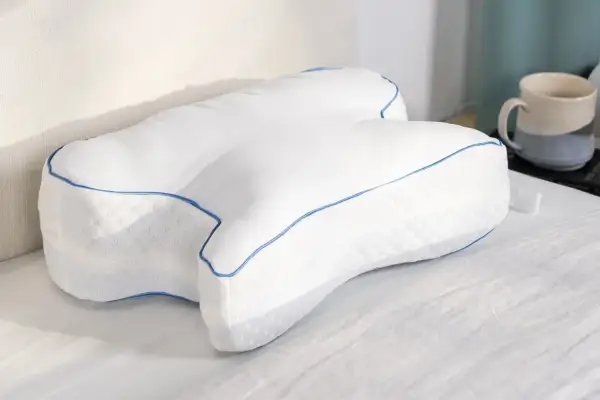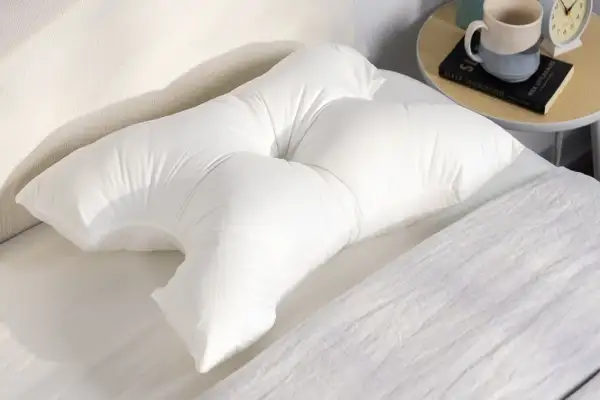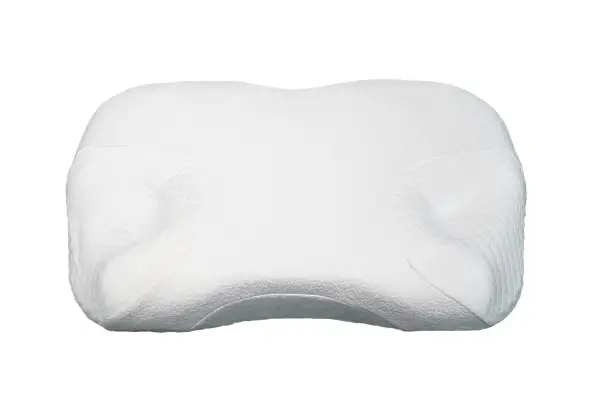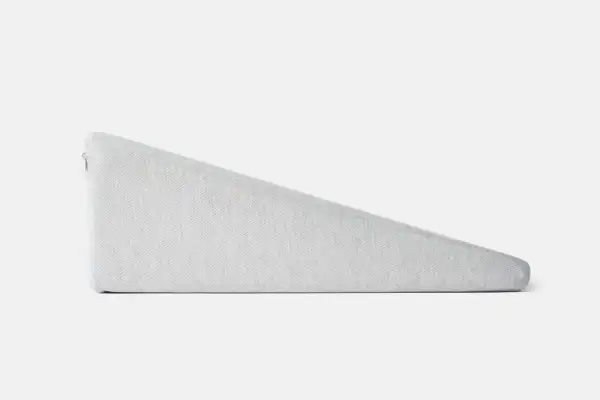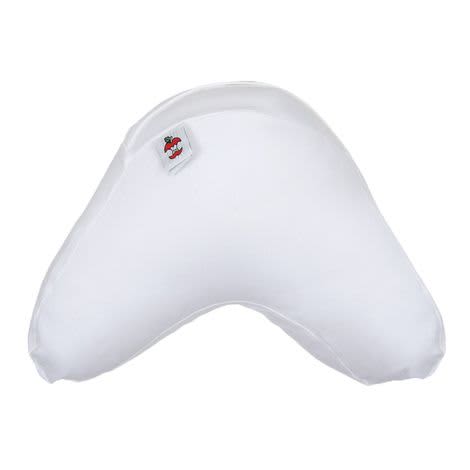Continuous positive airway pressure (CPAP) is an effective treatment for sleep apnea, an irregular breathing condition that occurs during sleep. Many people find CPAP therapy difficult to maintain because of the discomfort or awkwardness of navigating a mask and tubing. A CPAP pillow can improve therapy compliance by enhancing a sleeper’s comfort and support.
CPAP pillows have cut-outs, contours, and other features designed to accommodate sleeping with CPAP gear. They use supportive materials, like memory foam, to reinforce neck and spine alignment. A well designed CPAP pillow may help prevent CPAP air leaks while minimizing pressure points on the face and head.
We’ll share tips for finding the best CPAP pillow to meet your sleep preferences and needs. We’ll also answer common questions regarding prescriptions, insurance, and Medicare coverage.
Sleep Doctor’s picks
Best Overall
Contour CPAPmax CPAP Pillow 2.0
Details
Fill Material: Memory foam with fiber fill, support polyfoam
Firmness: Medium
Price: $80
Highlights
- Contoured shape with side cutouts to accommodate CPAP masks
- Customizable design allows you to adjust the profile
- Tether secures connective tubing to prevent rainout and air leaks
Ideal For
- Side and back sleepers
- People who wear full-face CPAP masks
- People who run hot in bed
The CPAPmax CPAP Pillow 2.0 from Contour is thoughtfully designed to ensure steady airflow during your therapy and keep you comfortable throughout the night. Contours on each side are intended to free up space for your CPAP mask, so you shouldn’t experience any discomfort — even if you wear a larger full-face model — while a hook-and-loop tether secures your connective hose to minimize crimping and leakage.
The pillow contains two inserts cushioned with adaptive foam and plush fiber fill. You can use both to create a thick profile ideal for side sleeping, or remove one if you prefer the back position. Easy adjustments also make the pillow a solid choice for combination sleepers who switch between their side and back. The foam is ventilated to offset heat retention and keep you cool.
The cover is soft and breathable with mesh side panels that promote airflow. You can wash and dry the cover in your household machines for quick, convenient care. The sticker price is approachable, and Sleep Doctor offers reasonable flat-rate shipping for customers in the contiguous U.S. You may return the CPAPmax CPAP Pillow 2.0 unused and unopened within 60 days of the delivery date.
Best for Side Sleepers
Borden Textile CPAP Pillow for Side Sleeping
Details
Fill Material: Down alternative microfibers
Firmness: Medium
Highlights
- Side cutouts help you sleep comfortably while wearing a CPAP mask
- Contoured shape provides excellent neck support
- Down alternative fill is plush, breathable, and hypoallergenic
Ideal For
- Side and back sleepers
- People who are allergic to real down
- Budget-conscious shoppers
Many people who use CPAP therapy sleep on their sides to ensure steady, uninterrupted airflow — but unfortunately, many pillows are less than ideal for this position. The aptly named CPAP Pillow for Side Sleeping from Borden Textile was specifically created with side sleepers in mind. Each side features a large cutout to make space for your CPAP mask and connective tubing, while dimples on the top and bottom provide optimal neck support.
The fill consists of down alternative clusters that mimic the lightness and plushness of real down without using animal-based materials, absorbing heat, or triggering allergies. A breathable cotton cover adds to the cooling design. You can wash and dry the entire pillow, making it quite easy to keep clean. A pillowcase is included with your purchase.
In addition to approachable pricing, the CPAP Pillow for Side Sleeping qualifies for reasonable flat-rate shipping when you order through Sleep Doctor. Returns of unopened and unused pillows are permitted within 60 days of the delivery date.
Best for Back Sleepers
cpaphero Hero CPAP Pillow
Details
Fill Material: Solid memory foam
Firmness: Medium
Price: $60
Highlights
- Contoured shape accommodates your face mask and connective hose
- Recessed bottom supports the neck and cradles the head
- Solid memory foam core is plush and adaptive
Ideal For
- Side sleepers
- People with frequent neck or shoulder pain
- Shoppers with tight budgets
A high-quality pillow doesn’t need to break the bank. Take the Hero CPAP Pillow from cpaphero, which contains solid memory foam that adapts to your head and neck for close, even support. The bottom of the pillow is recessed to ensure these areas are aligned with the rest of your spine, while cutsouts on each side free up space for your face mask and connective tube to maintain a tight seal and prevent air leaks.
The symmetrical design is ideal for side sleeping, whether you favor your right or left side. Memory foam’s deep contour has pressure-relieving qualities, so people with chronic or persistent neck and shoulder pain are also great candidates for this pillow. The outer cover is soft, breathable, and removable. Simply wash and dry the cover in your household machines, but the foam should only be spot cleaned as needed. Two pillowcases are included with each order.
Not only is the Hero CPAP Pillow relatively affordable compared to the competition, but your Sleep Doctor order qualifies for low flat-rate shipping if you reside in the contiguous U.S. Returns are allowed within 60 days of the delivery date as long as the pillow is unused and the original packaging hasn’t been opened.
Best Wedge Pillow
Helix Wedge Pillow
Details
Fill Material: Gel Memory Foam and Polyfoam
Firmness: Medium Firm
Price: $109
Highlights
- Sloped design that props up the upper body
- Machine-washable cover
- Free ground shipping to all 50 states
Ideal For
- Heavy snorers
- Those with acid reflux or post-nasal drip
- People who like to read or watch TV in bed
The Helix Wedge Pillow was an obvious pick due to its multi-functional design. A gradual slope elevates the upper body and may alleviate snoring, acid reflux, and post-nasal drip. The 10-inch incline may also reduce neck pain in some people. The sturdy wedge shape doubles as a support pillow when sitting up in bed.
The pillow’s machine-washable cover is a breathable blend of polyester and rayon. A layer of responsive memory foam conforms to sleepers, while gel infusions are designed to dissipate heat. The pillow may also reduce lower back strain when used beneath the knees or legs.
Back sleepers are well-suited to the pillow’s medium firmness. Cooling gel infusions and an airy cover are included to combat heat buildup.
The Helix Wedge Pillow comes in one standard size that measures 24 inches wide by 24 inches long. Helix Sleep ships the pillow for free to all 50 states. Customers have the reassurance of a 100-night sleep trial and a one-year warranty.
Best for Travel
Core Products Mini CPAP Pillow
Details
Fill Material: Down Alternative
Firmness: Medium
Price: $70
Highlights
- Fluffy yet supportive down alternative fill
- Compact, travel-friendly design
- Breathable cotton cover
Ideal For
- Frequent travelers
- People who dislike the feel of memory foam
- Hot sleepers
The Core Products Mini CPAP Pillow is smaller and fluffier than the typical CPAP pillow. Its down alternative fill is soft and moldable, yet it still retains its shape well. The pillow is a great alternative for people who find memory foam pillows too firm or heat-retentive.
The travel-friendly size is ideal for sleepers who don’t like to wrestle with a lot of pillow. Its compact crescent shape is less likely to interfere with your CPAP mask and hose. That said, the small size may not accommodate people with broader shoulders or side sleepers who frequently change sides.
The pillow measures 13 inches by 9 inches. While the width is slight, the 6-inch loft is thick enough to support side and back sleepers. A medium firmness keeps the pillow from flattening excessively.
A breathable cotton cover helps sleepers stay cool and dry. While the cotton cover isn’t removable, it can be spot-treated as needed. The pillow is compatible with most types of CPAP masks.
Shoppers can purchase the Core Products Mini CPAP Pillow from Target, CPAP specialty stores, and certain online retailers. The pillow is backed by a one-year manufacturer’s warranty. Shipping and return policies vary depending on the seller.
How we make our picks
As sleep specialists, we’re well-versed in sleep apnea and its treatment. Not all CPAP pillows are equal, which is why we’ve spent considerable time researching and comparing dozens of models. We considered performance features, brand reputation, customer reviews, price, and availability when choosing our top picks.
We consult medical doctors to ensure that our information and product reviews are backed by research and science. Our aim is to educate and empower readers so they can find the CPAP pillow most suited to their needs.
What is a CPAP pillow?
A CPAP pillow is a sleeping pillow designed in a way that may make using CPAP therapy more comfortable and secure. These pillows have special features to accommodate CPAP gear and reduce pressure points on the face and head. A well-constructed CPAP pillow may help prevent air leaks by stabilizing a user’s CPAP mask and hose.
How to sleep with a CPAP pillow
CPAP users should focus on a pillow’s loft and firmness when choosing a suitable model. Both of these features are key to promoting spinal alignment and making space for CPAP gear. The best height and firmness for you mostly depends on your sleep position, but your upper body size and preferences should also be considered.
| Side sleeping | Many CPAP pillows are designed for side sleeping. Pillows with side cut-outs allow space for your CPAP mask and hose. A moderately thick pillow that’s medium to firm promotes spinal alignment by not allowing your head to sink excessively. One that compresses too much will create pressure points as the mask digs into your face. A bulky pillow without cut-outs can cause air leaks by displacing your mask and hose. |
| Back sleeping | For back sleepers, pillows with a recessed center contour around the neck and reduce shoulder strain. A thinner pillow that is medium to medium firm helps keep your head from elevating too much. Back sleepers should avoid compact designs that might not provide enough shoulder support. Cut-outs aren’t as important since there’s less mask and hose interference when sleeping on your back. |
| Stomach sleeping | Stomach sleeping tends to interfere with CPAP equipment more than any other position. A minimal pillow design that adapts to your headgear is best. Stomach sleepers should look for adjustable pillows made from shredded memory foam or down alternative. These materials are more malleable and help keep masks from digging into your face. |
| Combination sleeping | Since combination sleepers switch positions, they need a versatile pillow with an adjustable loft. A moldable fill or optional inserts lets you adapt the pillow’s height and support to your needs. There are also dual-sided models to accommodate different positions. Most combination sleepers prefer a sizable pillow since it offers more surface area when adjusting positions. |
What is the best sleeping position for CPAP therapy?
Sleep position is shown to impact the severity of obstructive sleep apnea (OSA). Studies show that the upper airways are less obstructed when sleeping on your side, especially if the upper body is elevated.
Sleeping on your back is usually the least recommended position, since the throat’s soft tissues are more likely to block the airways in this position. Compared to back sleeping, people with OSA and central sleep apnea (CSA) have fewer breathing lapses when sleeping on their sides.
What is the best CPAP pillow for side sleepers?
Side sleepers need a pillow with curves or indents on both sides to make space for a mask and hose. These designs help stabilize masks while preventing them from pushing into your face. Many models also have a recessed area to contour to the neck and shoulders.
How to pick the right CPAP pillow for you
Your mask style and sleep position are top factors when choosing a CPAP pillow. Shoppers should consider how a pillow’s loft and firmness might accommodate their sleep style and CPAP equipment. Hot sleepers will want to note a pillow’s materials and temperature control, while budget-shoppers may need to prioritize value.
As with most purchases, always factor in your preferences and needs when choosing a CPAP pillow model.
Sleep position
Each sleep position has unique support and comfort needs during CPAP therapy. Side sleepers benefit from a pillow with side cut-outs that provide enough room for a mask. Stomach sleepers should look for a pillow with a recessed center to minimize facial pressure. Wedge or cervical pillows help promote spinal alignment for back sleepers.
Loft
Loft, or a pillow’s height, is crucial to promoting neck support. A suitable thickness is also needed to reduce pressure points from masks. Side sleepers require a thicker pillow to keep the head, shoulders, and spine even.
Pillows with recessed centers give stomach sleepers more space for their masks. A low to medium loft prevents back sleeper’s heads from elevating too much.
Your CPAP mask
Some mask styles are bulky and require more clearance from a pillow. Full-face masks are the largest, so generous pillow cut-outs may be preferred to minimize interference. Shallow grooves are usually enough to accommodate smaller nasal pillows and nasal masks. It’s important to find a pillow that works around your mask in order to prevent air leaks.
Price
CPAP pillows are often more expensive than your typical pillow since they have special design features and sturdier materials. Shoppers can expect to pay between $50 and $150 for a quality CPAP pillow. Most insurance providers don’t cover the cost of CPAP pillows since they are considered non-essential accessories.
Support and feel
A pillow’s support and feel is related to its firmness and height. Some pillows allow the head to sink in more, while firm pillows may hardly compress.
Sleep position and comfort preferences determine the support you need from a pillow. Side sleepers tend to require thicker and firmer pillows than back and stomach sleepers do.
Temperature neutrality
Some people tend to sleep hot, and CPAP gear can magnify heat retention. Hot sleepers should look for materials like down alternative, gel infusions, and perforated foams. Covers made from breathable materials like cotton can help wick away heat and moisture.
Prescription, insurance, and purchase information for CPAP pillows
Unlike CPAP machines, CPAP pillows are considered non-essential equipment and do not require a prescription. Shoppers can purchase CPAP pillows from bedding retailers and medical equipment suppliers.
CPAP pillows are classified as elective accessories, so Medicare and insurance companies usually don’t cover their cost. However, some providers might cover a percentage of certain CPAP accessories, so check with yours before making a purchase.
If your provider does provide partial coverage, you’ll probably have to purchase the pillow upfront, then submit a claim for reimbursement.
CPAP pillows are more widely available than other CPAP accessories since they don’t require a prescription. Shoppers can purchase CPAP pillows from CPAP specialty stores, medical equipment suppliers, and more general sleep stores.
New CPAP users may prefer purchasing from a brick-and-mortar retailer in order to get a feel for the pillow in person. An in-person store also allows the option of bringing in a CPAP mask to gauge compatibility. Online retailers, however, typically offer a wider selection of models. They tend to have lower prices too, since they have fewer overhead costs.
Ask the Sleep Doctor
Have questions about sleep? Submit them here! We use your questions to help us decide topics for articles, videos, and newsletters. We try to answer as many questions as possible. You can also send us an email. Please note, we cannot provide specific medical advice, and always recommend you contact your doctor for any medical matters.

